National Efficient Cooking Programme launched, to promote affordable and energy-efficient induction cookers
Energy Efficiency Services Limited (EESL), a joint venture of Public Sector Undertakings under Ministry of Power, launched its groundbreaking National Efficient Cooking Programme (NECP) and Energy Efficient Fans Programme (EEFP) today, unveiled by the Union Minister for Power and New & Renewable Energy Shri R. K. Singh, at an event held in New Delhi today, November 2, 2023. These initiatives are aimed at revolutionizing cooking practices in India and emphasizing on the importance and urgency of energy efficient fans. As part of these programmes, EESL will distribute 1 crore efficient BLDC fans and 20 Lakh energy-efficient induction cook stoves nationwide.
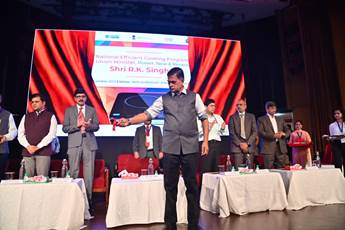
The National Efficient Cooking Programme (NECP) introduces induction-based cook-stoves, offering a cost advantage of 25-30% over traditional cooking methods, promising both energy savings and cost-effective cooking solutions. By deploying 20 Lakh Induction cook-stoves across India, EESL seeks to reduce the environmental impact of cooking methods, ensuring cleaner air and improved health for citizens. EESL has also partnered with Modern Energy Cooking Services (MECS) for the large-scale deployment of induction cooktops. The deployment is expected to accelerate the acceptance and large-scale adoption of modern electric cooking devices in Indian kitchens.
The Energy Efficient Fans Programme (EEFP) focuses on deploying energy-efficient BLDC fans, with the goal of distributing 1 crore ceiling fans. These initiatives not only reduce energy consumption and environmental impact, but also enhances consumer comfort while lowering electricity bills, creating a win-win situation for all. The program for deploying one crore ceiling fans was initiated during the G20 Energy Transitions Working Group in Goa in July 2023. In continuation of this, EESL is inviting the first bid of 20 lakh fans, under a programme titled Energy Efficient Fans Programme (EEFP).

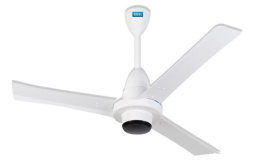
“Electric Cooking is one way to reduce dependence on imported sources for energy”
Addressing the gathering comprising the proud officials of EESL and others, the Union Power & NRE Minister underlined the strategic imperative due to which a shift towards electric cooking is necessary. “We have cooking based on imported Liquified Natural Gas. We can afford it financially, but in strategic terms, it is not advisable to depend on other countries for energy needs. This is one reason we need to shift from imported sources of energy to indigenous forms; and one way to do that is to shift our cooking to electricity.”
“Absolutely no difference between food cooked using e-cooking and gas stoves”
The Minister stressed that there is no difference in food cooked on flame versus that cooked using induction cookers. “We need to propagate this; all organizations under Ministry of Power and Ministry of New & Renewable Energy will help in propagating this, all organizations will get together to bring to every household the advantages of shifting to electric cooking, in terms of price and availability.”
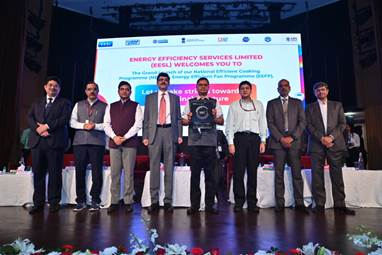
“E-Cooking will reduce cooking costs of poor families”
Shri Singh explained how a shift to electric cooking will help the ordinary citizen. “Even though we subsidize our gas cylinders, many poor families are not able to afford buying gas cylinders. So, this brings us back to cooking based on fossil fuels. Electric cooking, I believe, is the answer to this problem; especially for poor consumers, if they switch over to electric cooking, it will reduce their cooking costs, after accounting for cost of electricity as well.”
“Energy inefficient fans will be rapidly phased out”
The Minister also sent a message to all manufacturers that inefficient fans will be rapidly phased out. “The fans brought out by EESL are Five-Star. We are going to phase out inefficient fans at a rapid pace. All manufacturers in both organized and unorganized sectors may take note. We want the people of India to get the best. We want to be and will continue to be a world leader.”
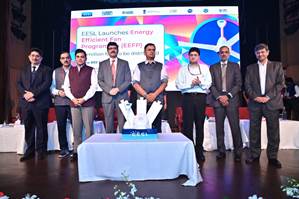
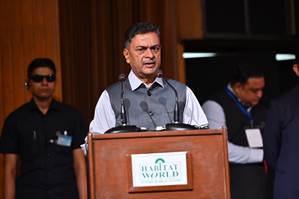
“EESL and BEE have played a stellar role in India’s energy transition journey”
The Minister commended EESL and Bureau of Energy Efficiency (BEE), both organizations under the Ministry of Power, for making a stellar contribution to India emerging as a world leader in energy transition. Shri Singh recalled that the roadmap for energy transition adopted by the government has been to electrify the economy with an aim to shift it from other forms of energy to electricity and then to green the electricity. “About 44% of our capacity is already non-fossil-fuel sources, about 25% in energy terms. By 2030, around 65% of our capacity will be from non-fossil-fuel sources, and in energy terms, it will be around 40% – 45%. And we have been able to reach where we are today, largely due to the efforts of BEE and EESL. Both have come out with schemes which are world-leaders.” EESL has been responsible for shifting our lighting to LEDs, despite many hurdles, notwithstanding the shortfall in financial resources for local bodies, the Minister added.
Complimenting and congratulating EESL for the success with LED programme, the Minister said: “You need to do with the cooking stove what you did with the LED.”
“Energy Efficient Fans Programme will trigger huge replacement demand”
Addressing the gathering, Union Power Secretary, Shri Pankaj Agarwal said that the two programmes launched today are outstanding and will play a catalytic role. He said that the Energy Efficient Fans Programme will lead to a huge replacement demand. “The fans market in the country is about Rs. 10,500 crores, comprising about 200 players and around 14 branded fans. A lot of the demand which is coming is not only new demand but replacement demand as well. The Star labelling programme is going to trigger a huge replacement demand. I hope that Indian manufacturers are geared up with the products. The Demand aggregation being provided by EESL will bring economies of scale and also create huge outreach.”
Shri Agarwal added that low-hanging fruits for electrification of economy are electrification of mobility and of cooking. “Electric induction-cooking market is about 10 million units a year; We have huge ambitions for energy transition. EESL initiative will help expand access, bring prices down and provide benefits to citizens at large,” Shri Agarwal said.
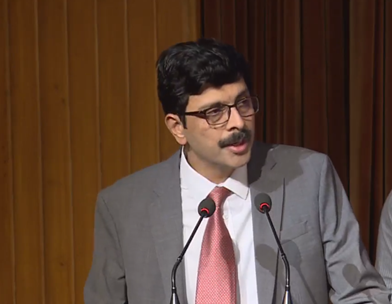
“India led the world in setting Energy Transition Agenda at G20”
The Power Secretary noted that India played a leadership role in setting the agenda for energy sector and energy transition for the world, as President of the G20. “We have been a leader in energy transition, we are walking the talk. We notified Renewable Purchase Obligations (RPOs), for which we laid down mandates in Energy Conservation Act. We gave states to meet obligations as per their preferences. One area in which a hard obligation has been set is in the area of distributed renewable energy, in which we want to really work hard and meet our high aspirations.”
Director General, BEE, Shri Abhay Bakre emphasized that energy transition has to take place in an affordable and equitable manner, keeping in mind national circumstances. “In this, not only supply side, but demand side efficiency improvement and demand side energy management are also critical. We have already put forth a very clear roadmap for doubling energy efficiency. These demand side measures have the potential of reducing greenhouse gas emissions by almost 40% by 2050.”
The DG added that the two initiatives launched today will go a long way in delivering the schemes to the doorstep of the common citizen. “If we have a higher share of electrification in all sectors, this indicates that we are reaching towards a developed country. So, when we aspire to become a developed country in a few decades, electric cooking is a very good solution.”
Chief Executive Officer (CEO), EESL, Shri Vishal Kapoor said: “With the launch of the National Efficient Cooking Programme and the Energy Efficient Fan Programme, EESL is taking bold steps to enhance energy efficiency and reduce carbon footprints in Indian households. Our past initiatives, such as the distribution of millions of LED bulbs under UJALA and installation of streetlights under Street-lighting National Programme, have already made a substantial impact by reducing energy consumption, preventing peak demand, and cutting CO2 emissions.”
The launch event can be watched here.
#EnergyEfficiencyRevolution – Launch of NECP and EEFP https://t.co/R0KTI6WBJB
— EESL India (@EESL_India) November 2, 2023
“National Efficient Cooking Programme” (NECP) is a subset of the Clean Cooking Scheme. NECP focuses on Non-Solar/Electricity-based Induction Cookstoves, aligning with the Go- electric initiative by the Ministry of Power. EESL has already initiated efforts to promote clean and safe electric cooking to support India’s Go-electric campaign and contribute to carbon mitigation goals.
The induction cooktop market’s rapid growth is driven by its efficiency, technology, and aesthetic appeal. With over 10 million units sold in 2021-22, increased demand is attributed to factors like modular kitchens, rising LPG costs, and the versatility of cooking with induction. Northern and western India are leading in sales, while portability, convenience, and safety make induction stoves increasingly popular. They are seen as an efficient and safer alternative to traditional gas and electric stoves, contributing to the market’s steady expansion. Additionally, induction cooking’s adoption in various food outlets and the growing awareness of its benefits are fuelling its growth.
Energy Efficient Fans Programme (EEFP)
EESL has been actively dedicated to encouraging the adoption of energy-efficient appliances, such as LED bulbs, tube lights, and high-performance fans. Beginning January 1, 2023, the Bureau of Energy Efficiency (BEE) has mandated that ceiling fans must bear star labels.The annual ceiling fan market in India comprises approximately 4.4 crore units. Notably, ceiling fans contribute to approximately *40% of total residential electricity consumption, which accounts for over a quarter of India’s overall electricity usage. By replacing all current ceiling fans with the most efficient models available today, nearly 20% of total residential electricity consumption can be reduced. EESL aims to capitalize on this potential for savings by deploying 1 crore 5-star energy-efficient ceiling fans across India.
Conventional fans typically consume 75-80W, whereas contemporary 5-star fans consume only 28-32W, and 3-star fans use 40-45W. Remarkably, the adoption rate of 5-star energy- efficient fans stands at a mere 5%, indicating substantial potential for energy conservation.
Energy Efficiency Services Limited (EESL) intends to enhance the market for efficient fans by deploying one crore efficient ceiling fans throughout the country. The program for deploying one crore ceiling fans was initiated during the G20 Summit in Goa in July 2023. In this continuation, EESL is inviting the first bid of 20 lakh fans.
About Energy Efficiency Services Limited
Energy Efficiency Services Limited (EESL), operating under the Ministry of Power, is a leading Energy Service Company. Their portfolio encompasses energy-efficient products like LED bulbs, tube lights, fans, air conditioners, streetlights, and electric vehicles. EESL’s transparent procurement processes, overseen by CVC, have enabled them to distribute millions of these products, resulting in substantial energy savings, reduced peak demand, and greenhouse gas emissions.

